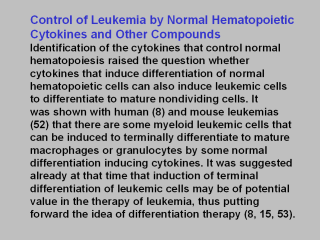 |
The results have shown that
differentiation-competent clones (called D+ clones) of mouse leukemic cells
induced to differentiate with a cytokine such as IL-6 to mature nondividing
cells by the normal sequence of gene expression (15, 26, 53, 54) were no
longer malignant when injected into mice (55). In addition to DI clones that
can be induced to differentiate by IL-6 and can also be induced to partially
differentiate with G-CSF, there are DI clones from another myeloid leukemia
that can be induced to differentiate with GM-CSF or IL-3 but not with IL-6
or G-CSF (26-29). In clones that respond to these CSFs, the growth inducers
presumably induce production of an appropriate differentiation inducer. DI
leukemic cells that respond to IL-6 can also be induced to differentiate' by
IL-1a and IL-113, and this is mediated by the endogenous production of IL-6
(27). The DI myeloid leukemic cells have an abnormal chromosome composition
(56, 57). Suppression of malignancy in these cells was not associated with
chromosome changes and the differentiating leukemic cells did not regain the
normal diploid chromosome complement. The stopping of cell multiplication by
inducing differentiation to mature cells thus bypassed genetic changes that
produced the malignant phenotype, such as a loss of requirement for a normal
cytokine for cell viability and multiplication, and a block in the ability
of a multiplication inducing cytokine to induce the production of a
differentiation inducing cytokine (reviewed in refs. 25-27 and 58). |
